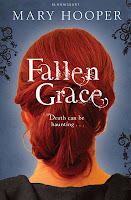Mary Hooper
(Bloomsbury Children’s Books)
Having given birth to a stillborn illegitimate child, Grace Parkes, who is not yet 16, finds herself boarding at train to Brookwood Cemetery, where she hopes to leave her son’s body in someone else’s coffin, allowing him the burial that she herself cannot afford. Although born in a “good” family, Grace and her sister Lily have found themselves slipping into poverty after their mother died. Having fled the charitable establishment they were staying in after both girls were assaulted by a mysterious one-handed man (which resulted in Grace’s pregnancy) they are left selling cress on the streets.
While at Brookwood, Grace comes across two people: James Solent, whose sister’s coffin Grace has chosen for her son, and Mrs Unwin, of the Unwin Undertaking Establishment. James offers Grace his card, might she ever need to find solace and Mrs Unwin offers Grace a job as a mute. Unbeknown to Grace, both will have a profound effect on her future. But her immediate future is looking bleak as Grace returns to her sister Lily: there is barely any money left, hardly any work and they are soon evicted from their house. Reluctantly, Grace finds herself forced to take on the job of mute. The unscrupulous Unwins are uncharacteristically charitable to the girls and are keen to take on, but what Grace does not know is that her sister and herself are in fact the subject of a huge scam which would allow the Unwins to get hold of their newly discovered (and unbeknown to them) inheritance. And they will stop at nothing to get their grubby hands on it.
Set in a London Dickens would have approved of (he himself makes an appearance in the story) and packed-full of historical detail, this thrilling tale is packed with intrigue and twists which will have you gripped. This is a real rags-to-riches story, reminiscent of A Little Princess, with a kind and selfless girl at its core who has many wrongs done to her before she eventually triumphs. Grace is a great heroine; she is strong but not over-confident, beautiful but no vain, innocent but not gullible. Mary Hooper’s narrative is very enjoyable and clever; she leaves enough hints for us to work out links between characters without ever making it explicit in the text. The text is very atmospheric too; you can smell the foul smells that surround the Thames, you can feel your skin crawling with the filth of the warehouse in Southwark. But this is not just a great story; the strong underlying themes of extreme poverty, child labour, abuse and social injustice are the backbones of this story. This social critique of Victorian London gives this book the edge over many teen historical books. You can see Dickens’ influence there, and it is little wonder that Mary Hooper is such a respected author in this field.
One of her other historical novels, At the Sign of the Sugared Plum, has in fact been selected as one of the Booked Up books for this September.
You can read the first chapter of Fallen Grace here.
Note to self: Stop telling people you don’t like historical fiction because it is proving to be unfounded and untrue!






Sounds like a great book. I also wanted to let you know how much I enjoy your blog. It’s great to hear about British books – I’m a librarian in Canada, and like to keep track of good books out of my usual sphere of publishers and promos.
Hi Paige, it is a great book!
Do you find a lot of our authors don’t get published in Canada? I read about a lot of authors of US blogs who never seem to make it across to us.
My library makes a conscious effort to order UK items. I get a few really good journals and catalogues – Books for Keep is one of my favourites.